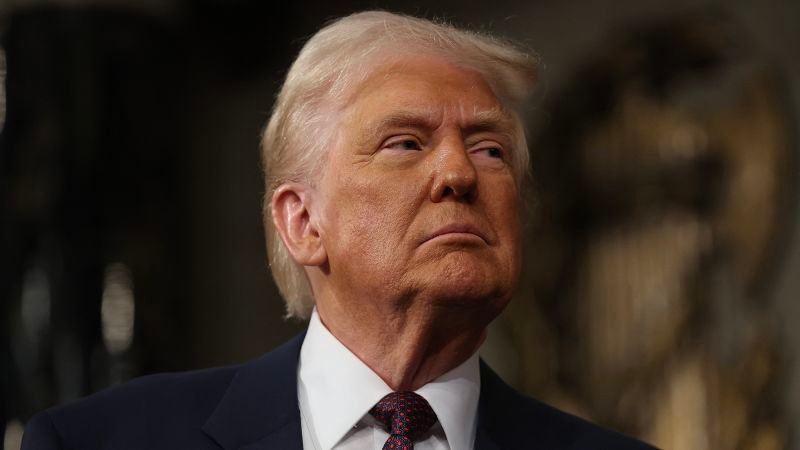Live Updates
The latest on Trump’s call with Zelensky and his legal battle over deportation flights
” data-timestamp-html=”
” data-check-event-based-preview data-is-vertical-video-embed=”false” data-network-id data-publish-date=”2025-03-19T01:10:32.182Z” data-video-section=”world” data-canonical-url=”https://www.cnn.com/2025/03/18/world/video/grozev-trump-putin-russia-call-ukraine-digvid” data-branding-key data-video-slug=”grozev-trump-putin-russia-call-ukraine-digvid” data-first-publish-slug=”grozev-trump-putin-russia-call-ukraine-digvid” data-video-tags data-breakpoints=”{“video-resource–media-extra-large”: 660}” data-display-video-cover=”true” data-details data-track-zone=”live-story-lede” data-sticky-anchor-pos=”bottom”>
Journalist on Russia’s ‘wanted list’ breaks down ‘alpha male’ message from Putin to Trump
02:01 – Source: CNN
Journalist on Russia’s ‘wanted list’ breaks down ‘alpha male’ message from Putin to Trump
02:01
• Trump-Zelensky call: After a call between President Donald Trump and his Ukrainian counterpart today, the two leaders “agreed on a partial ceasefire against energy” according to US officials. After his call yesterday with Trump, Russian President Vladimir Putin agreed to temporarily halt attacks on energy and infrastructure targets in Ukraine.
• DOJ vs. federal judge: A federal judge extended his deadline for the Justice Department to provide more information about deportations the Trump administration carried out last weekend, after the DOJ sought a delay and claimed the judge is “continuing to beat a dead horse” by seeking the information. The White House said today it will continue its deportation campaign, but has no plans for more flights like those the judge blocked.
• Possible Pentagon cuts: The Pentagon is weighing major cuts to the top of the US military, according to a document obtained by CNN, as the Trump administration makes sweeping efforts to shrink the federal government amid multiple legal challenges.
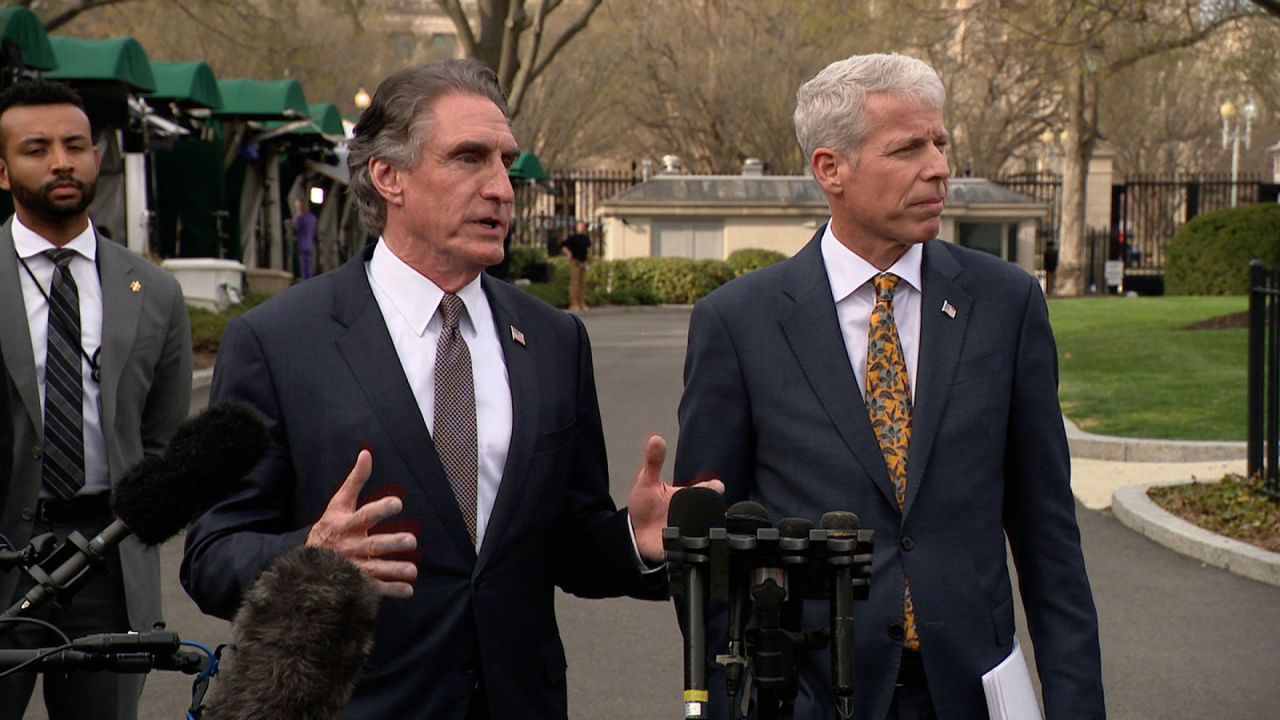
Energy Secretary Chris Wright and Interior Secretary Doug Burgum wouldn’t weigh in on a suggestion from President Donald Trump that the United States take ownership of Ukrainian electrical and nuclear power plants.
The two secretaries today told CNN’s Kaitlan Collins they had “no comment” on the suggestion.
The administration first floated the suggestion in a readout from Trump’s call with Ukrainian President Volodymyr Zelensky earlier today. National Security Adviser Mike Waltz and Secretary of State Marco Rubio wrote in the readout that Trump “discussed Ukraine’s electrical supply and nuclear power plants” and “said that the United States could be very helpful in running those plants with its electricity and utility expertise.”
“American ownership of those plants would be the best protection for that infrastructure and support for Ukrainian energy infrastructure,” the statement added.
Pressed in a follow-up on more details regarding the United States’ approach to Ukraine’s energy plants, Burgum told reporters: “We got no comment on Ukrainian nuclear” remarks. Wright also added: “Yeah, no comment on that.”

US President Donald Trump and Ukrainian President Volodomyr Zelensky spoke on the phone today, a day after Trump spoke to their Russian counterpart Vladimir Putin.
Trump wrote on Truth Social that the call, which lasted about an hour, was “very good” and the discussion was focused on aligning “both Russia and Ukraine in terms of their requests and needs”
Zelensky also described the phone call as a “positive, very substantive and frank conversation.” He adopted a measured and grateful tone in his statement following the call, thanking Trump for “a good and productive start to the work.”
In a statement, US Secretary of State Marco Rubio and national security adviser Mike Waltz said the two leaders “agreed on a partial ceasefire against energy.”
Here’s what the two leaders discussed:
- Zelensky asked Trump for additional Patriot missile systems, and Trump told him he’d help him find what was available “particularly in Europe,” according to a readout of the two leaders’ call from Secretary of State Marco Rubio and national security adviser Mike Waltz.
- The two leaders “agreed to share information closely between their defense staffs,” the statement added.
- Trump also “discussed Ukraine’s electrical supply and nuclear power plants,” according to the statement and suggested American ownership, which “would be the best protection for that infrastructure and support for Ukrainian energy infrastructure.”
- Trump “fully briefed” Zelensky on his phone call yesterday with Putin, with the statement saying that the nations agreed to what it called “a partial ceasefire against energy.”
- Trump and Zelensky also discussed Ukrainian air defenses, prisoners of war and children abducted by Russia, a source told CNN, saying the call was “not just a recall of yesterday’s conversation” with Putin. “President Trump asked many questions, including which (air defense) systems are the best, what can really work and how to help,” the source added.
The next talks planned on a ceasefire and end to the war in Ukraine won’t involve top US cabinet level officials and will be at a technical level with expert officials, the State Department said.
Meanwhile, here’s what else is happening in Ukraine:
- Russian strike on Ukrainian railway infrastructure: Four people were injured in the attack on the Dnipropetrovsk region, according to state railroad company Ukrainian Railways.
- Russia attacks eastern Ukraine: Moscow launched a fresh wave of aerial attacks on Wednesday evening in eastern Ukraine — Kupiansk and Zaporizhzhia region, authorities said.
- Zelensky addresses Russian claims of Belgorod military operation: Zelensky responded to Russian claims that Ukrainian troops attempted a ground incursion into Russia’s Belgorod region, saying: “As long as the enemy is on our territory, we can do everything to prevent Putin’s moves to seize additional territories. He is striving for this.” The Russian Defense Ministry claimed Tuesday it had “thwarted” Ukraine’s attempts.
- Russia targeted two Ukrainian medical facility: Two Russian drones initially struck the medical facility in Krasnopillia, followed by five more attacks during the hospital’s evacuation, according to Ukraine’s State Emergency Service. In a separate drone strike late Tuesday evening, Russia carried out a “direct hit” on a Ukrainian hospital in the same region, Zelensky said.
CNN’s Mick Krever, Lauren Izso, Christian Edwards, Catherine Nicholls and Max Saltman contributed to the report.
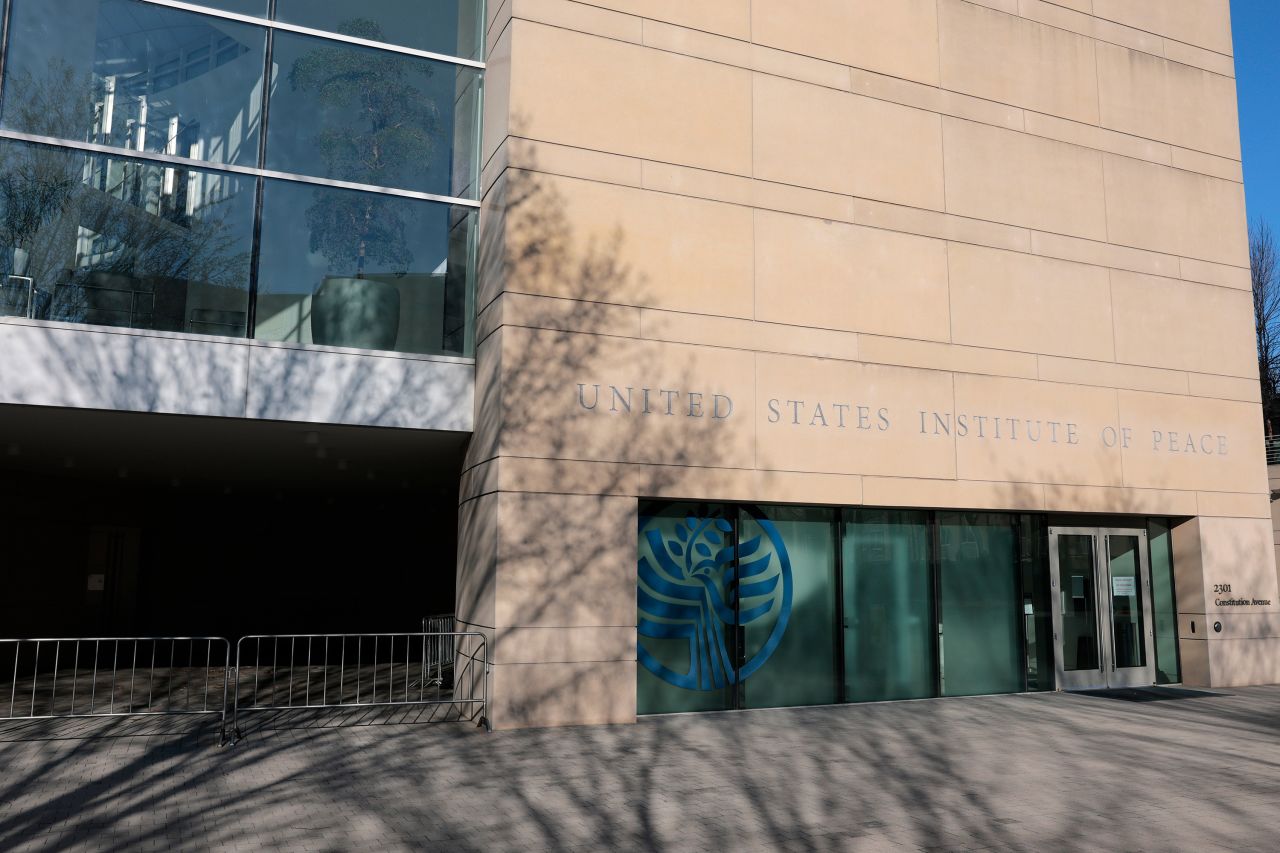
A federal judge today declined to remove officials with the Department of Government Efficiency (DOGE) from the US Institute of Peace building, despite expressing grave concern about the use of armed law enforcement in gaining access.
While district Judge Beryl Howell expressed extreme disappointment in DOGE’s use of armed law enforcement to enter the USIP building, the Obama-appointed DC judge did not grant a temporary restraining order to reinstate USIP board members and to remove DOGE from the building.
The case has revealed DOGE’s use of FBI enforcement, US Department of State officers and Metropolitan Police Department officers in days-worth of attempts to get into the building. The FBI also threatened the removal of contracts from a private company and former contractor of USIP that had a key to the building; the private company complied, according to court filings.
“Are you the least bit offended by how this was executed,” Howell asked US Attorney Brian Hudak.
“I’ll answer the question this way…” Hudak began before she cut him off.
Howell, however, said she needs further briefing on whether the charitable organization is functioning under the executive branch and whether the violated statute outlining how board members are removed is actually lawful on its own.
She asked the counsels to discuss a schedule for expedited briefing.
The Trump administration confirmed in a federal court Wednesday that there are “ongoing discussions” between the Department of Homeland Security and the Internal Revenue Service over sharing highly confidential taxpayer data that could lead to deportations of undocumented immigrants.
Undocumented immigrants can register with the IRS and pay taxes, and the agency is required to keep their private information confidential, except in very specific circumstances specified in the tax code. Two immigrant rights groups filed a lawsuit to block the Trump administration from turning over this data to immigration authorities as they ramp up deportations.
“There are ongoing discussions … about information sharing” between the IRS and Homeland Security, Justice Department lawyer Andrew Weisberg said Wednesday during a hearing in DC federal court.
Weisberg refused to provide additional details when pressed by a judge. But he said the IRS would only divulge information about undocumented immigrants if Homeland Security submitted individual requests for data on a specific person that fall under provisions allowing legal disclosures.
Several news outlets reported in in February that the IRS rejected a request from Homeland Security to provide the home addresses of 700,000 people suspected of being in the country illegally. A senior IRS privacy official said in a sworn affidavit earlier this week that the agency hasn’t turned over any information to Homeland Security about the 700,000 people in question.
Spokespeople from the IRS and Homeland Security didn’t respond to CNN’s request for comment.
District Judge Dabney Friedrich on Wednesday declined to issue an emergency order blocking the IRS from sharing this data, concluding that the groups who sued the administration didn’t present enough evidence that this was at risk of happening immediately and that Homeland Security’s data requests would violate the law.
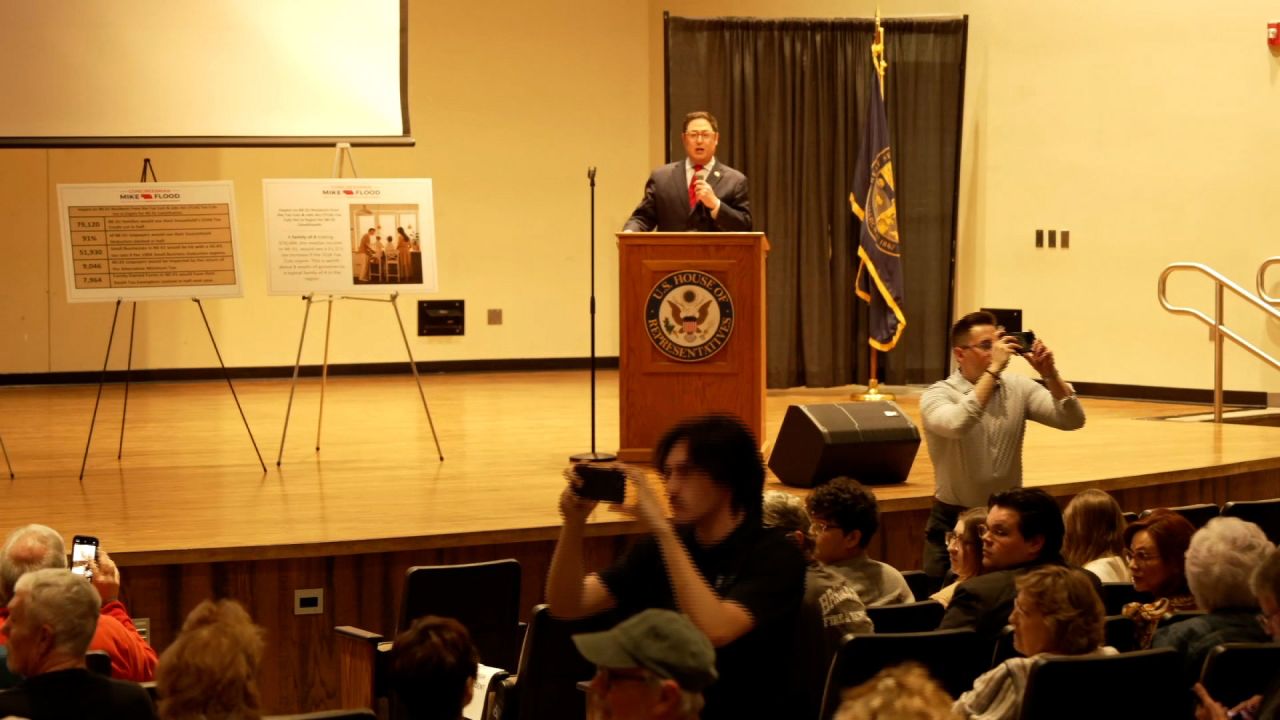
Republican Rep. Mike Flood of Nebraska told CNN he sees “a lot of value to what happened” in a town hall he held last night in his home district, despite facing intense heckling, booing, and jeering during the event.
The lawmaker said “a lot of the concerns” he heard during the town hall were about the federal spending cuts that tech billionaire Elon Musk and the Department of Government Efficiency are making.
And while he defended DOGE’s government cuts, Flood acknowledged the process hasn’t been perfect.
“I think last night was an opportunity for me to say, ‘Hey, these cuts are necessary if we want to get back on track.’ Is it a perfect process? No,” he said.
“One of the things that I wanted people to take away from that last night is that if you tell me what you’re concerned about, and I look into it, if I see an issue that needs to be brought to the attention of the executive branch, or to be dealt with in our appropriations committee, or in Congress, I’m going to do that,” Flood said.

President Donald Trump, in a letter to Iran’s Supreme Leader Ayatollah Ali Khamenei proposing negotiations on a new nuclear deal, made clear that Iran has a two-month deadline to reach an agreement, a source familiar with the letter’s contents told CNN.
The directive comes as Trump has said he would like to reach a deal with Iran to gain more control over their nuclear capabilities. Trump’s Middle East envoy Steve Witkoff delivered the letter to the president of the United Arab Emirates Mohammed bin Zayed Al Nahyan while he was in Abu Dhabi last week, the source said. The UAE later gave the letter to the Iranians.
Axios was the first to report on the contents of the letter.
Trump also discussed a potential nuclear deal with Iran during his phone call with Russian President Vladimir Putin on Tuesday, according to a White House readout of the call.
Earlier this month, Trump told Fox News that there “are two ways Iran can be handled: militarily, or you make a deal. I would prefer to make a deal, because I’m not looking to hurt Iran.”
It is unclear how the US would respond if Iran fails to enter direct talks regarding its nuclear program. However, senior US officials have not ruled out potential military action, whether through the US or Israel, on Iran’s nuclear facilities in the future.
The next talks planned on a ceasefire and end to the war in Ukraine won’t involve top US Cabinet-level officials, but instead will be at a technical level with expert officials, the State Department said.
That contradicts what Special Envoy Steve Witkoff told Fox News on Tuesday. He said Secretary of State Marco Rubio and national security adviser Mike Waltz would be going back to Jeddah for meetings on Sunday.
That hasn’t been planned, according to officials.
State Department spokesperson Tammy Bruce said today that the talks will be attended by “technical teams.”
“It will not be principals going to those negotiations,” she said at briefing, adding it would be “senior staff addressing technical frameworks.”
Earlier, Waltz said he had spoken with his Russian counterpart today and that the meeting between the US and Russian teams will take place in Riyadh “in the coming days.” Ukrainian President Volodymyr Zelensky also said in a statement today that officials from his country “are ready” to meet in Saudi Arabia with American counterparts in the next few days.
“We instructed our advisors and representatives to carry out this work as quickly as possible,” Zelensky said in a post on X following his call with US President Donald Trump.
It is unclear whether all three teams would meet together, which would be the first time since the Trump administration launched the effort to end the war. Trump administration officials have approached these discussions directly with each country, hoping to eventually to narrow the gaps and get both sides together at the negotiating table.

Ukrainian President Volodymyr Zelensky asked President Donald Trump for additional Patriot missile systems, and Trump told him he’d help him find what was available “particularly in Europe,” according to a readout of the two leaders’ call from Secretary of State Marco Rubio and national security adviser Mike Waltz.
The statement also noted that the two leaders “agreed to share information closely between their defense staffs,” with White House press secretary Karoline Leavitt, who first read the statement at today’s press briefing, telling reporters that intelligence sharing for defense will be shared between the US and Ukraine.
Trump also “discussed Ukraine’s electrical supply and nuclear power plants,” according to the statement and suggested American ownership.
“He said that the United States could be very helpful in running those plants with its electricity and utility expertise. American ownership of those plants would be the best protection for that infrastructure and support for Ukrainian energy infrastructure,” the statement said.
Trump “fully briefed” Zelensky on his phone call yesterday with Russian President Putin, with the statement saying that the nations agreed to what it called “a partial ceasefire against energy.”
“Technical teams will meet in Saudi Arabia in the coming days to discuss broadening the ceasefire to the Black Sea on the way to a full ceasefire. They agreed this could be the first step toward the full end of the war and ensuring security. President Zelenskyy was grateful for the President’s leadership in this effort and reiterated his willingness to adopt a full ceasefire,” Waltz and Rubio said.
What else to know about the call: Trump and Zelensky also discussed Ukrainian air defenses, prisoners of war and children abducted by Russia, a source told CNN, saying the call was ““not just a recall of yesterday’s conversation” with Putin. The telephone call was longer than initially expected, the source said. “President Trump asked many questions, including which (air defense) systems are the best, what can really work and how to help,” the source added.
White House press secretary Karoline Leavitt blasted judges who she said are “acting erroneously” and are “partisan activists from the bench” trying to “derail” President Donald Trump’s agenda, as she brushed off the suggestion that US District Judge James Boasberg may eventually rule in the administration’s favor over its widespread deportation agenda.
In the days since Boasberg temporarily blocked the administration’s deportation flights to El Salvador, members of the administration—including Trump and Deputy Chief of Staff Stephen Miller—have lambasted the district judge, even calling for his impeachment.
But Leavitt also took the opportunity Wednesday to criticize other judges who she claims stymied parts of Trump’s domestic agenda, including judges who temporarily halted the administration’s ban on transgender service members in the military and who ruled Trump’s dismantling of USAID violated the Constitution.
“If you just look at the injunctions that this president has faced, deporting foreign terrorists from our homeland, hiring and firing of executive branch employees,” she told Zeleny. “You also see an injunction by a partisan activist judge when it comes to the Secretary of Defense trying to determine the readiness of our troops and the qualifications of our troops in our armed forces. Does a single district court judge really have more authority over the commander in chief and the Secretary of Defense to determine who should serve in our United States Armed Forces? Absolutely not.”
White House press secretary Karoline Leavitt said Wednesday it’s prepared to take legal challenges over the Trump administration’s abrupt firing of two Democratic members of the Federal Trade Commission all the way to the Supreme Court, telling reporters during the press briefing, “The time was right to let these people go.”
“The president absolutely has the authority to do it, and they were given ample notice,” Leavitt said. “The goal was to let these individuals go — if we have to fight it all the way to the Supreme Court, we certainly will.”
In a pair of statements posted to X Tuesday, Commissioners Alvaro Bedoya and Rebecca Slaughter wrote they’d been “illegally fired,” from the FTC, which was formed 111 years ago to enforce consumer protection and antitrust laws.
Former Biden FTC Chair Lina Khan called the firings an “illegal attempt” to remove the commissioners, adding that the dismissals are “a gift to corporate lawbreakers that squeeze American consumers, workers, and honest businesses” in a post on X.
Ukraine’s President Volodymyr Zelensky described his lengthy phone call with US President Donald Trump on Wednesday as a “positive, very substantive and frank conversation.”
The call was the first known conversation between Trump and Zelensky since the two leaders’ blowup in the Oval Office 19 days ago, and it came a day after Trump spoke to the Russian President Vladmir Putin.
Zelensky adopted a measured and grateful tone in his statement following the call, thanking Trump for “a good and productive start to the work.”
The statement did not comment on the fact that Trump’s call with Putin ended without the Russian leader formally agreeing to a ceasefire deal.
“We believe that together with America, with President Trump, and under American leadership, lasting peace can be achieved this year,” Zelensky said.
Zelensky did, however, touch on one of the issues that became a sticking point between Ukraine and the US, specifically mentioning that “in further meetings, the (US and Ukrainian) teams can agree on all necessary aspects of advancing toward lasting peace and security guarantees.”
The Trump administration has rejected Ukraine’s demands for security guarantees in exchange for a ceasefire agreement, and the issue of whether security guarantees would be part of a natural resources deal between the two countries was one of the reasons why the Oval Office meeting between Zelensky and Trump collapsed last month.
White House press secretary Karoline Leavitt said today that the White House readout of the call between President Donald Trump and Russian President Vladimir Putin, which stated that the Kremlin agreed to temporarily halt attacks on “energy and infrastructure” targets in Ukraine, is the “truth.”
Leavitt was asked by CNN’s Jeff Zeleny to clarify the discrepancy between the the Kremlin’s readout of the call and the White House version:
“The US statement said ‘energy and infrastructure.’ The Kremlin said ‘energy infrastructure.’ What is your understanding of what the actual substance of that disagreement was?” Zeleny asked.
Following Tuesday’s call between Trump and Putin, the Kremlin said Russia would temporarily halt attacks on energy infrastructure targets in Ukraine, but Putin stopped short of agreeing to a broader temporary ceasefire. Ukraine and Russia exchanged aerial assaults overnight.
Earlier today, Trump had a call with Ukrainian President Volodymyr Zelensky, which he said was “very good.”
White House press secretary Karoline Leavitt told reporters today that Americans can expect to see more deportations, but stopped short of saying the administration would continue deportation flights under the Alien Enemies Act like those to El Salvador that the administration carried out last weekend despite a judge’s order temporarily blocking them.
Pressed, however, if the administration plans to continue deportation flights like the ones transporting migrants to El Salvador, Leavitt told reporters, “We don’t have any flights planned specifically, but we will continue with the mass deportations.”
Trump has taken to Truth Social to blast Boasberg as “crooked” and call for his impeachment, prompting a rare rebuke from Supreme Court Chief Justice John Roberts.
“Look, the president has made it clear that he believes this judge in this case should be impeached,” Leavitt said, adding that while the president “has great respect for Chief Justice Roberts,” he believes “it’s incumbent upon the Supreme Court to rein in these activist judges.”
House Minority Leader Hakeem Jeffries told House Democrats in a private call today that he had a “frank and honest” conversation with Senate Minority Leader Chuck Schumer about party unity going forward, according to two people who listened to the call.
Jeffries told members that he disagreed with Schumer’s decision to back down from a funding fight with President Donald Trump. And he stressed in future fights, Democrats “need to be united,” those on the call said.
The Democrats’ conference call is the first time that Jeffries has personally addressed his caucus since Schumer’s decision to clear a path for the GOP funding bill last week, opening a party-wide schism over strategy to counter Trump. Jeffries and Schumer met in Brooklyn over the weekend.
Today’s conversation mostly focused on House Democratic messaging efforts and the importance of talking about potential cuts to Medicaid, Medicare and Social Security and holding community events.
One Democratic lawmaker, Rep. Glenn Ivey of Maryland, suggested the party should pick a new leader in the Senate during a town hall last night. He said Democrats in the House had “Hakeem Jeffries lead the fight against the” stopgap bill, while “Schumer was on the other side.”
“I respect Chuck Schumer. I think he’s had a great, long-standing career. He’s done a lot of great things. But I’m afraid that it may be time for the Senate Democrats to pick new leadership as we move forward,” he added.
This post has been updated with comments from Rep. Ivey and CNN’s Brian Todd contributed reporting.

The Pentagon is considering making significant cuts to the top of the US military as the Trump administration seeks to shrink the federal government, according to a briefing document obtained by CNN and a US defense official.
The plans under consideration include consolidating combatant commands, possibly eliminating a directorate that oversees development, training and education for the joint force, and halting the expansion of US Forces Japan.
The Pentagon is also considering merging European Command and Africa Command into a single command based in Stuttgart, Germany, and combining US Northern and Southern commands into a single AMERICOM command, according to the document obtained by CNN.
More on the document: The document was prepared this month by US defense officials for senior leaders, as Elon Musk’s Department of Government Efficiency has pushed the Pentagon and other federal agencies to make sweeping cuts to save money.
Secretary of Defense Pete Hegseth said in a video last month that DoD would be leaning on DOGE to help the department “find fraud, waste and abuse in the largest discretionary budget in the federal government.”
The US military’s current annual budget is over $800 billion.
President Donald Trump is warning Iran to stop sending military supplies to the Houthis “immediately.”
“Reports are coming in that while Iran has lessened its intensity on Military Equipment and General Support to the Houthis, they are still sending large levels of Supplies. Iran must stop the sending of these Supplies IMMEDIATELY,” he posted on Truth Social.
“Let the Houthis fight it out themselves,” Trump said. “Either way they lose, but this way they lose quickly. Tremendous damage has been inflicted upon the Houthi barbarians, and watch how it will get progressively worse — It’s not even a fair fight, and never will be. They will be completely annihilated!”
Trump’s latest message comes after he launched “decisive” strikes against Houthi rebels in Yemen over the weekend.
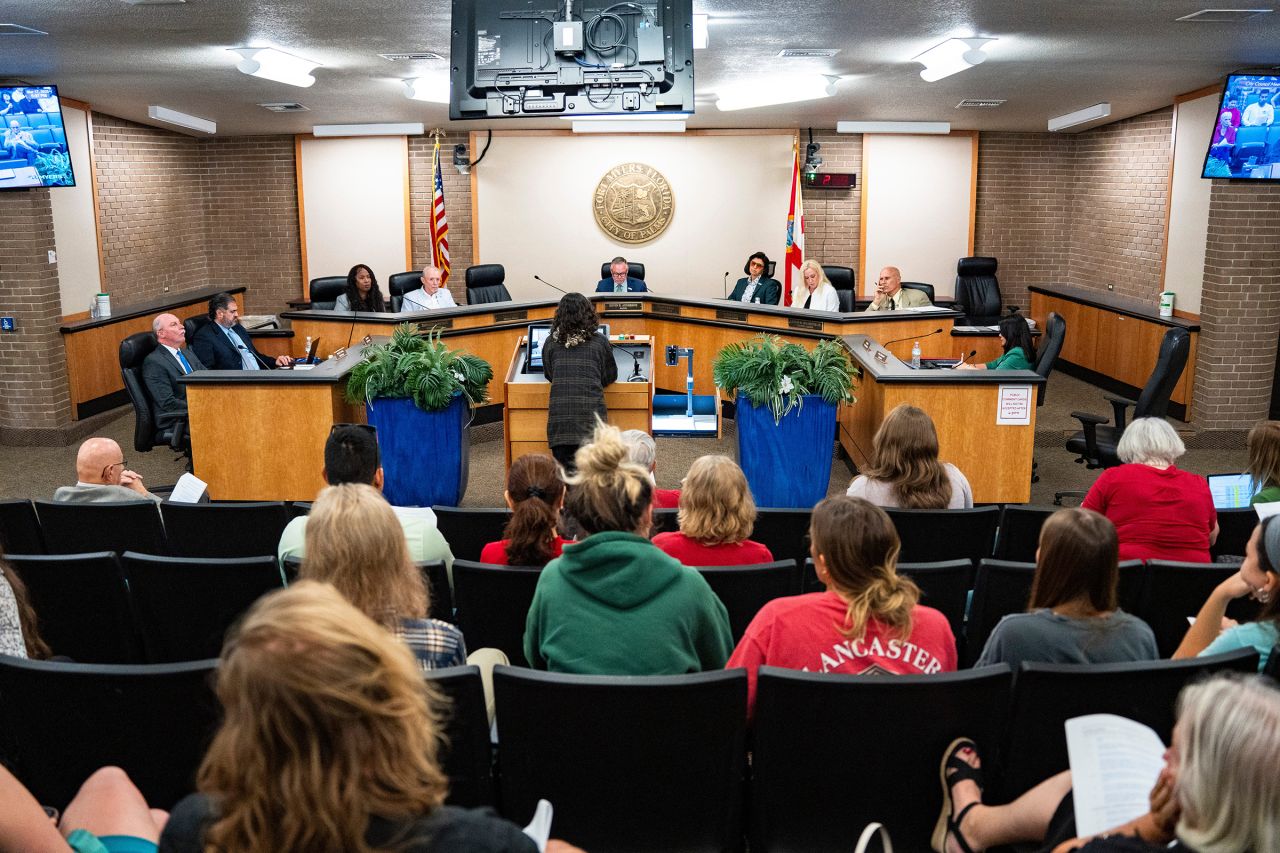
Florida’s top attorney is threatening Fort Myers City Council with “removal from office” if they don’t cooperate with Immigration and Customs Enforcement and the White House’s immigration crackdown.
In what marks the state’s first public fight to get local agencies to play ball with the federal government’s mass deportations, the council on Monday blocked a motion to create an agreement between the Fort Myers Police Department and ICE.
The council’s three-to-three deadlock halted a proposed immigration partnership with the federal government via its 287(g) program, which would deputize police officers and empower them to be involved in immigration enforcement while out in the community.
The newly-added Task Force Model of the 287(g) program — which ICE describes as a “force multiplier” — allows law enforcement to exert immigration authority beyond county jails by receiving ICE training to “enforce limited immigration authority with ICE oversight” during routine police duties, according to the ICE website.
In February, the Sunshine State became the first state in the nation to sign this task force agreement for a state police agency. So far, 110 Florida law enforcement agencies have been approved to participate in the new task force model with other agencies pending.
Florida Gov. Ron DeSantis also signed a bill requiring local law enforcement to participate in immigration enforcement.
Florida’s Attorney General James Uthmeier posted a letter on X calling the rejection of this proposed immigration partnership by Fort Myers City Council a “serious and direct violation” of Florida law that bans “sanctuary cities.” The governor, Uthmeier warned, has the executive authority to remove city council members from their positions.
CNN has reached out to Fort Myers City Council, the mayor’s office and AG’s office for further comment. Fort Myers City Council will hold a special meeting on Friday to reconsider the agreement between ICE and the Fort Myers Police Department.
US District Judge James Boasberg has extended his deadline for the Justice Department to provide the court with information about deportations the Trump administration carried out last weekend under the Alien Enemies Act, or decide if it will invoke “state-secrets privilege” to avoid divulging the information.
Boasberg, ruling just before his self-invoked deadline of today at noon, extended his deadline until Thursday at noon.
But Boasberg, who for a time presided over the Foreign Intelligence Surveillance Court, said he was “unsure at this time how compliance with (his order for the information) would jeopardize state secrets.”
If the DOJ decides to invoke the privilege, the judge wrote in a 4-page order, he “is obligated to ‘determine whether the circumstances are appropriate for the claim of privilege.’”
Boasberg also pushed back strongly on arguments the Justice Department made this morning that it should not have to comply with his request for the information because the government believes he overstepped his authority last weekend when he sought to halt deportations of individuals under the Alien Enemies Act.
“As the Supreme Court has made crystal clear, the proper recourse for a party subject to an injunction it believes is legally flawed — and is indeed later shown to be so flawed — is appellate review, not disobedience,” the judge said.
President Donald Trump said his phone call today with Ukrainian President Volodymyr Zelensky was “very good” and lasted roughly one hour, with much of the conversation focusing on his talk with Russian President Vladimir Putin on Tuesday.
“We are very much on track, and I will ask Secretary of State Marco Rubio, and National Security Advisor Michael Waltz, to give an accurate description of the points discussed. That Statement will be put out shortly,” he added.
The call is the first known conversation between Trump and Zelensky since the two leaders’ blowup in the Oval Office 19 days ago.
The Trump administration has paused $175 million in federal funding to the University of Pennsylvania, the president’s alma mater, claiming it has violated an executive order barring transgender women from competing in women’s sports, a White House official told CNN.
In a post on X, the Trump administration’s Rapid Response team noted the funding had been paused, while posting a Fox Business segment, and writing, “Promises made, promises kept.” Fox Business first reported the funding pause.
The administration’s executive order states that all executive departments and agencies “shall review grants to educational programs and, where appropriate, rescind funding to programs that fail to comply with the policy established in this order.”
The funding paused at the University of Pennsylvania was not the result of a Title IX investigation launched by the Department of Education, a senior White House official told CNN.
The official described the move as “immediate proactive action to review discretionary funding streams” to universities the Department of Education has identified for its investigation, which includes the University of Pennsylvania, San Jose State University and the Massachusetts Interscholastic Athletic Association.
The pause of about $175 million in funding was from the Departments of Defense and Health and Human Services, the senior official added.
President Donald Trump earned his undergraduate degree from the University of Pennsylvania’s Wharton School of Finance in 1968, after transferring from Fordham University,
UPenn response: The University of Pennsylvania said in a statement that it has “not yet received any official notification or any details” about paused federal funding.
“It is important to note, however, that Penn has always followed NCAA and Ivy League policies regarding student participation on athletic teams. We have been in the past, and remain today, in full compliance with the regulations that apply to not only Penn, but all of our NCAA and Ivy League peer institutions,” according to a spokesperson.
This post has been updated with additional reporting.
